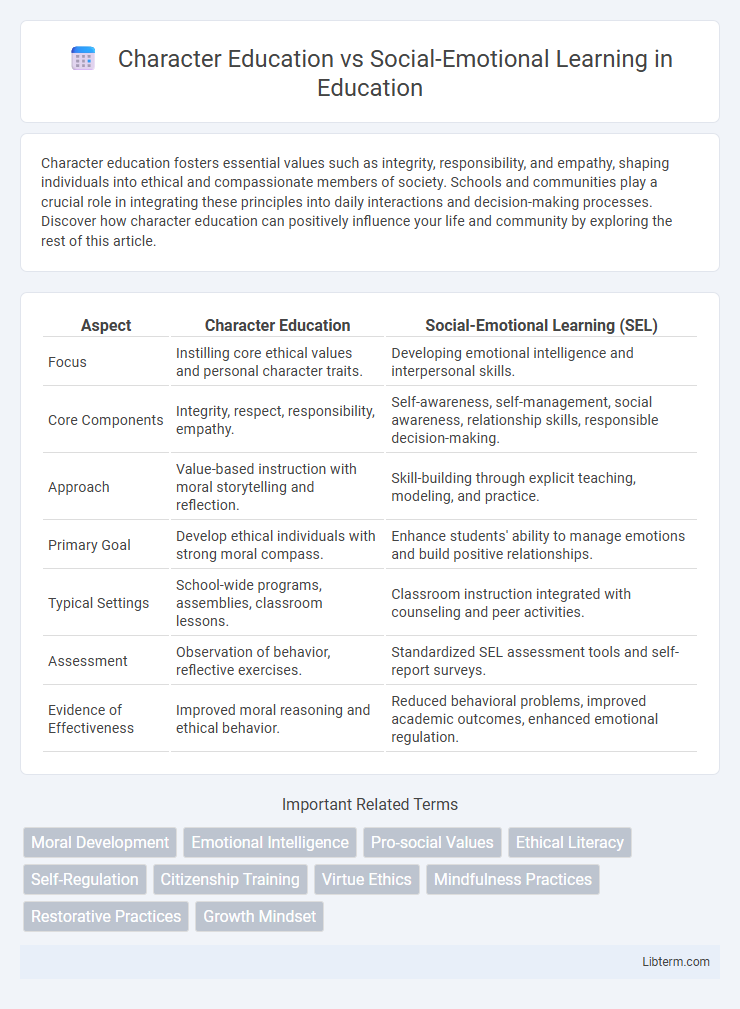Character education fosters essential values such as integrity, responsibility, and empathy, shaping individuals into ethical and compassionate members of society. Schools and communities play a crucial role in integrating these principles into daily interactions and decision-making processes. Discover how character education can positively influence your life and community by exploring the rest of this article.
Table of Comparison
| Aspect | Character Education | Social-Emotional Learning (SEL) |
|---|---|---|
| Focus | Instilling core ethical values and personal character traits. | Developing emotional intelligence and interpersonal skills. |
| Core Components | Integrity, respect, responsibility, empathy. | Self-awareness, self-management, social awareness, relationship skills, responsible decision-making. |
| Approach | Value-based instruction with moral storytelling and reflection. | Skill-building through explicit teaching, modeling, and practice. |
| Primary Goal | Develop ethical individuals with strong moral compass. | Enhance students' ability to manage emotions and build positive relationships. |
| Typical Settings | School-wide programs, assemblies, classroom lessons. | Classroom instruction integrated with counseling and peer activities. |
| Assessment | Observation of behavior, reflective exercises. | Standardized SEL assessment tools and self-report surveys. |
| Evidence of Effectiveness | Improved moral reasoning and ethical behavior. | Reduced behavioral problems, improved academic outcomes, enhanced emotional regulation. |
Defining Character Education: Core Principles
Character education emphasizes the cultivation of virtues such as integrity, responsibility, and respect through explicit instruction and modeling of moral values. Core principles include fostering ethical decision-making, promoting civic responsibility, and encouraging personal accountability in students. This approach aims to develop well-rounded individuals who demonstrate strong moral character both in and out of the classroom.
Understanding Social-Emotional Learning (SEL)
Understanding Social-Emotional Learning (SEL) involves recognizing its focus on developing skills like self-awareness, emotional regulation, and interpersonal communication, which enhance students' ability to manage emotions and build positive relationships. SEL programs integrate evidence-based strategies to foster emotional intelligence and resilience, supporting academic success and mental well-being. Unlike Character Education, which emphasizes moral values and ethical behavior, SEL prioritizes practical emotional competencies essential for personal and social development.
Historical Evolution of Character Education and SEL
Character Education has its roots in ancient philosophy and religious teachings aimed at moral development, evolving through the 20th century with a focus on virtues like honesty and responsibility. Social-Emotional Learning (SEL) emerged in the 1990s, grounded in psychological research on emotional intelligence and social skills necessary for mental health and academic success. Both approaches reflect a shift from solely cognitive education to holistic development, integrating ethical behavior and emotional regulation in school curricula.
Key Goals: Moral Values vs Emotional Skills
Character Education centers on cultivating moral values such as honesty, respect, and responsibility to guide students' ethical decision-making and behavior. Social-Emotional Learning (SEL) prioritizes developing emotional skills including self-awareness, empathy, and emotional regulation to enhance interpersonal relationships and personal well-being. Both approaches aim to support student development, but Character Education focuses on instilling core ethical principles, while SEL targets the mastery of emotional competencies.
Comparing Teaching Methods in Character Ed and SEL
Character education emphasizes direct instruction of core values such as integrity, respect, and responsibility through storytelling, role-playing, and moral discussions. Social-emotional learning (SEL) incorporates experiential activities, mindfulness practices, and collaborative problem-solving to develop self-awareness, empathy, and emotional regulation. Both teaching methods focus on holistic student development but differ in approach: character education centers on value transmission, while SEL prioritizes emotional skill-building and interpersonal competence.
Impact on Student Behavior and Academic Success
Character education fosters core values such as integrity, responsibility, and respect, which directly enhance student behavior by promoting ethical decision-making and reducing disciplinary issues. Social-emotional learning (SEL) develops skills like emotional regulation, empathy, and relationship building, leading to improved classroom engagement and collaborative learning. Both approaches contribute to academic success by creating supportive environments that encourage positive behaviors and social skills, resulting in higher achievement and reduced behavioral problems.
Role of Teachers and School Culture
Teachers play a crucial role in both Character Education and Social-Emotional Learning by modeling positive behaviors and fostering an inclusive classroom environment that promotes empathy, responsibility, and self-regulation. School culture that supports collaborative practices, consistent reinforcement of core values, and emotional support enhances the effectiveness of these programs in developing students' moral reasoning and interpersonal skills. Emphasizing a healthy school climate with strong teacher-student relationships leads to improved academic outcomes and overall student well-being.
Parental Involvement in Both Approaches
Parental involvement plays a crucial role in both Character Education and Social-Emotional Learning (SEL) by reinforcing core values and emotional skills at home. In Character Education, parents actively support moral development and ethical behavior through consistent modeling and communication of virtues such as respect, responsibility, and integrity. In Social-Emotional Learning, parents engage in activities that foster emotional awareness, self-regulation, and interpersonal skills, creating a supportive environment that complements school-based SEL programs and enhances children's social competence.
Challenges and Criticisms of Character Ed vs SEL
Character Education often faces criticism for its perceived rigidity and moral absolutism, which can alienate diverse student populations and oversimplify complex social issues. In contrast, Social-Emotional Learning (SEL) challenges include inconsistent implementation and the risk of prioritizing emotional skills over academic rigor. Both approaches struggle with measurement difficulties, raising questions about effectiveness and long-term impact on student development.
Integrating Character Education and SEL for Holistic Growth
Integrating Character Education and Social-Emotional Learning (SEL) enhances holistic growth by fostering both ethical values and emotional intelligence in students. Programs combining SEL skills such as self-awareness, empathy, and responsible decision-making with character traits like integrity and respect create well-rounded individuals prepared for complex social environments. Research highlights that this dual approach improves academic performance, promotes positive behavior, and supports mental health development in educational settings.
Character Education Infographic

 libterm.com
libterm.com